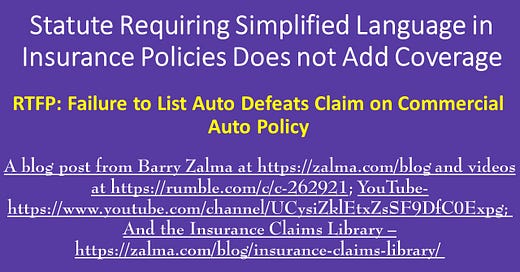Statute Requiring Simplified Language in Insurance Policies Does not Add Coverage
Failure to List Auto Defeats Claim on Commercial Auto Policy
To those of you who wished me a Happy Birthday, - thank you. I am now 79 and will continue to work and write every day until I no longer can.
Posted on June 28, 2021 by Barry Zalma
People try to save money on insurance by acquiring the smallest limits available. Then, when they incur a loss, they try to expand the coverages available with arguments to courts that the injured person needs the money, regardless of the policy wording.
In Marilou Marie Hatler v. Mountain West Farm Bureau Mutual Insurance Company, and John Does I-III, 4:20-cv-69-BMM, United States District Court For The District Of Montana Great Falls Division (June 24, 2021) Marilou Hatler (“Plaintiff”) sued to obtain a declaration that she is entitled to medical payments coverage (“MPC”) and underinsured motorist coverage (“UIM”) under her husband’s businessowners motor vehicle insurance policy (“Policy”) issued by Mountain West Farm Bureau Mutual Insurance Company (“Mountain West” or “Defendant”).
Both Plaintiff and the insurer filed motions for summary judgment.
BACKGROUND
Plaintiff was driving her Oldsmobile Alero when another vehicle struck her on September 21, 2017. Plaintiff sustained severe injuries from the accident. Plaintiff settled with the tortfeasor for the full limits of the tortfeasor’s liability policy coverage. Plaintiff received additional coverage through an insurance policy that she purchased for the Alero from Liberty Mutual, but it was not enough to satisfy Ms. Hatler.
Plaintiff’s husband, Pat Hatler, purchased separately a Businessowner’s insurance policy from Mountain West for his drywall and painting contractor business. The Policy lists Pat Hatler as the named insured. The Policy includes a section titled “Commercial Auto Coverage.” This section describes the scope of MPC and UIM for covered accidents.
Plaintiff asserts that the Policy also provides MPC and UIM coverage for her accident. On three separate occasions, Plaintiff requested that Defendant pay the full, stacked limits of the Policy’s MPC and UIM to cover her medical expenses incurred from the accident. Defendant denied coverage. Plaintiff sued.
ANALYSIS
The Policy’s Medical Payments Coverage (MPC) endorsement provides that Mountain West “will pay reasonable expenses incurred for necessary medical” care from an accident for the named insured. The Policy includes medical coverage for a “family member” of the named insured. The Policy also includes several exclusions to the MPC endorsement. Relevant to this case, the Policy excludes coverage for a bodily injury “sustained by any ‘family member’ while ‘occupying’ . . . any vehicle (other than a covered ‘auto’) owned by or furnished or available for the regular use of any ‘family member.'”
Defendant argued that the exclusion covers Plaintiff by its plain terms. The Alero is not listed as a “Covered auto.” Plaintiff suffered injuries in an accident while she occupied the Alero. Defendant argues that the Policy’s plain text requires application of the exclusion.
The exclusion in question appears on the same page of the Policy as the section initially granting MPC. The exclusion itself appears clear and unambiguous in its terms. The “Covered auto” exclusion carves out a precise exception to the general rule articulated in the endorsement—an exception meant to capture those autos the insured pays a premium to cover under the Policy.
Plaintiff argued that a reasonable insured would not consult any other portion of the Policy to determine which autos are covered under the Policy. Plaintiff’s proposed reading of the Policy by section conflicts with clear requirements of Montana law that require an insured to consult an insurance policy as a whole.
The Policy’s plain text proves clear and unambiguous. Nothing in the Policy language entitles Plaintiff to MPC when she occupied a non-covered auto during her accident. Mountain West has met their burden of demonstrating the MPC exemption applies to the Plaintiff as a matter of law.
Underinsured Motorist Coverage
The UIM lists among those insured “any ‘family member'” and “[a]nyone else ‘occupying’ a Covered ‘auto’ or a temporary substitute for a Covered ‘auto.'”
The Policy also lists several exclusions. One such exclusion stipulates that UIM coverage does not extend to bodily injury sustained by a family member while they occupied “any vehicle (other than a Covered auto).” The scope of “any vehicle” includes a vehicle that was owned by that family member that is “not a Covered ‘auto’ for Uninsured Motorists Coverage under this Coverage Form.”
The Policy language taken in its entirety unambiguously modifies the coverage available rather than changes the operative definition of what qualifies as a “Covered auto.” Plaintiff further asserts the UIM exclusion proves unenforceable because a reasonable insured would have difficulty finding the exclusion, the definitions of “Covered auto,” and the inclusion of underinsured motorist coverage within the gambit of UIM. The UIM exclusion in the Policy applies to Plaintiff in this case and bars UIM coverage to Plaintiff.
The Montana Property and Casualty Insurance Policy Language Simplification Act
Plaintiff separately argues that the Policy violates the Montana Property and Casualty Insurance Policy Language Simplification Act (“Simplification Act”). Montana adopted the Simplification Act to “establish minimum language and format standards to make property and casualty policies easier to read.” The Simplification Act also sought to avoid increasing “the risk assumed under policies” or impeding “flexibility and innovation in the development of policy forms or content.” The Simplification Act requires a policy to include “a table of contents and notice section of important provisions.”
Plaintiff’s argued that the policy needed an expanded index proved to be unavailing. Plaintiff failed to propose a limiting principle for how an insurance company should prepare a lawful table of contents. As Plaintiff argues, a valid table of contents would have to include any coverage feature that potentially could defeat coverage. This requirement would cover nearly all provisions of a given insurance policy, and produce, in essence, a table of contents as long as the insurance policy itself.
The Simplification Act was not written to expand the Policy to cover family members occupying autos that otherwise would not be covered under the Policy. Plaintiff failed to list the Alero in the Policy and failed to pay premiums to cover the Alero under the Policy. Plaintiff instead insured the Alero under a separate policy with Liberty Mutual. The Court refused to invalidate the Policy’s reasonable coverage exemptions to expand coverage to the Alero in conflict with the Simplification Act.
The undisputed facts and plain language of the Policy denies Plaintiff’s coverage. The Policy does not violate the Simplification Act because the Simplification Act does not require every possibly important provision of the Policy to be included in an index or table of contents. Further, invalidation of the MPC and UIM exceptions would expand coverage in violation of the Simplification Act.
ZALMA OPINION
In the 54 years I have been involved with insurance only two insureds were willing to testify that they read and understood their policy: both lied. Whether a policy is simplified, whether it has an extensive table of contents, it will invariably not be read until there is a loss that a creative lawyer can read in an attempt to obtain coverage not intended by the insured or the insurer at the time it was acquired. The argument on the Simplification Act was creative but unavailing since to apply it as the plaintiff suggested the table of contents would be as big as the policy itself. Judges properly refuse to create coverage that does not exist. The court read the full policy and applied it as written.
© 2021 – Barry Zalma
Barry Zalma, Esq., CFE, now limits his practice to service as an insurance consultant specializing in insurance coverage, insurance claims handling, insurance bad faith and insurance fraud almost equally for insurers and policyholders. He also serves as an arbitrator or mediator for insurance related disputes. He practiced law in California for more than 44 years as an insurance coverage and claims handling lawyer and more than 52 years in the insurance business. He is available at http://www.zalma.com and zalma@zalma.com.
Mr. Zalma is the first recipient of the first annual Claims Magazine/ACE Legend Award.
Over the last 53 years Barry Zalma has dedicated his life to insurance, insurance claims and the need to defeat insurance fraud. He has created the following library of books and other materials to make it possible for insurers and their claims staff to become insurance claims professionals.
Go to the podcast Zalma On Insurance at https://anchor.fm/barry-zalma; Follow Mr. Zalma on Twitter at https://twitter.com/bzalma; Go to Barry Zalma videos at Rumble.com at https://rumble.com/c/c-262921; Go to Barry Zalma on YouTube- https://www.youtube.com/channel/UCysiZklEtxZsSF9DfC0Expg; Go to the Insurance Claims Library – https://zalma.com/blog/insurance-claims-library/ Read posts from Barry Zalma at https://parler.com/profile/Zalma/posts; and the last two issues of ZIFL at https://zalma.com/zalmas-insurance-fraud-letter-2/ podcast now available at https://podcasts.apple.com/us/podcast/zalma-on-insurance/id1509583809?uo=4






